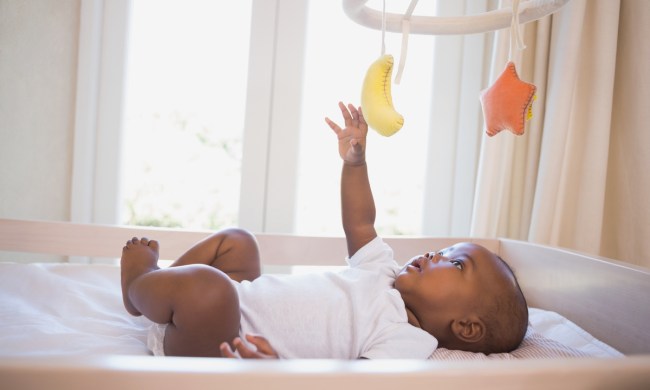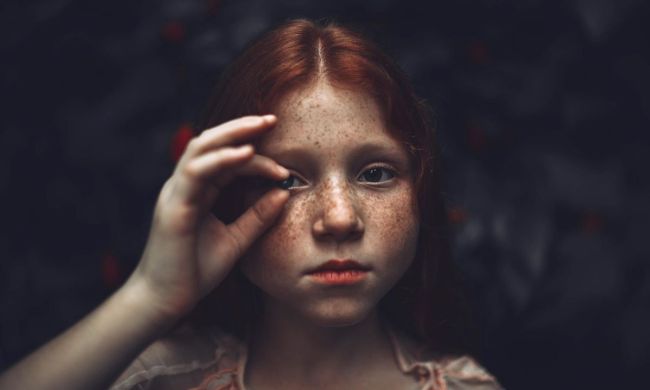Have you ever watched your precious baby while they slept? Of course, you have. Have you noticed their mouth twitch, making it look like they smiled in their sleep? Have you sworn it looked like their pudgy little hand was reaching out for you, even for a second? If you watch your baby sleep for long enough, you’ll notice all kinds of movement.
Should any of these moves and twitches alarm you? Are they all just innocent baby quirks? If you’ve tilted your head and wondered if your baby is the only one who jerks around while they sleep, we can help put your worries to rest. Let’s go over what a newborn twitching in their sleep can mean and if you should ever take your concerns to the doctor.

Sleep myoclonus
Sleep myoclonus is the scientific name for the muscle twitches that we’re talking about. From hiccups to leg twitches to an eye twitch — these are all kinds of myoclonic twitches. A baby sleeps for at least 14 hours a day; that’s a lot of time for that little body to move around.
A study by Carlos Del Rio-Bermudez and Mark Blumberg found that “sensory feedback from self-generated myoclonic twitches also triggers neural oscillations in those structures.” If that sounds a bit too much like science class, let’s take it apart a bit more.
Why is my newborn twitching so much?
A few reasons
- Developing fine motor skills
- REM sleep activates sensorimotor development
- Brain teaching the body what it can do
- Adjusting to light or sound
There are a few reasons why you notice a little twitch while your baby is sleeping. Not all of them require you to freak out. You have probably woken yourself up to a muscle spasm or leg twitch and gone right back to sleep without giving it another thought. For your baby, it’s a similar situation. A sudden sound or switching on a light can make your baby give an involuntary twitch.
Also, for a baby, those extra movements of the wrists, feet, and face can be a good thing. According to Mark Blumberg, Professor in the Department of Psychology and Brain Sciences at the University of Iowa, and Gretta Sokoloff, a research scientist, believes that “when the sleeping body twitches, it’s activating circuits throughout the developing brain and teaching newborns about their limbs and what they can do with them.”
Blumberg has also found that there are “intriguing relationships between twitching and the skills that babies are developing.” So if your baby is learning to support that large melon head, while they’re sleeping they may have more twitches around the neck area. That makes absolute sense. Your baby will twitch where they’re possibly learning a new skill in their body.

Is it normal for newborns to twitch when they sleep?
If you see your baby twitch in their sleep, it is normal. All of us twitch while sleeping. But especially during that first year of your little one’s life, you’ll notice it more often when they sleep.
These spasms “serve as ‘self-stimulation’ proving sensory information to the brain when disconnected from the world,” according to Jan Born, Professor of Medical Psychology and Behavioral Neurobiology at the University of Tubingen, Germany.
A study done by Sokoloff, Blumberg, and other professionals showed “at all ages that twitching across the body occurs predominately in bursts at intervals of 10 seconds or less.” As long as the twitches are within those parameters while sleeping, everything is fine.

When should I worry about baby twitching?
The twitches that happen while your baby is asleep should not be cause for any concern for you. But, if the twitches don’t stop once your tyke is awake – that’s when you should pay attention to them.
While awake, look out for
- Convulsions
- Spasms
- Seizures
Again, these would happen when your baby is awake to cause alarm. But if you notice your baby having more intense twitching while they’re sleeping and it’s bothering you, try waking them up. If the movements don’t stop, then you should make an appointment with your child’s pediatrician.
If you happen to have your phone by you and can record the movement that’s concerning you, that would be great so the doctor has a visual of what happened.
It doesn’t matter if you are a first-time parent and every little thing makes you take note, or have had a few kids and have just now noticed these movements while your baby is asleep — seeing your child spasm in their sleep could make you wonder what’s going on.
If for any reason you feel the twitches are becoming more intense or you just don’t like the frequency or duration of them, never be afraid to be your child’s advocate and call the pediatrician. But if you see the occasional jerk from your tiny human, know that it’s normal and it happens to all babies. Let that tiny tot sleep and let their brain learn how to control their little body. They have a lot of park days ahead of them and they need that coordination.



